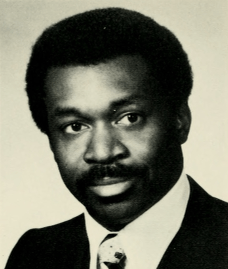Raymond A. Jordan facts for kids
Quick facts for kids
Raymond A. Jordan
|
|
|---|---|

Jordan in 1983
|
|
| Member of the Massachusetts House of Representatives from the 12th Hampden district district |
|
| In office January 1, 1975 – February 28, 1994 |
|
| Personal details | |
| Born | May 5, 1943 Springfield, Massachusetts |
| Died | February 5, 2022 (aged 78) Springfield, Massachusetts |
| Political party | Democratic |
Raymond A. Jordan Jr. (born May 5, 1943 – died February 5, 2022) was an important American politician. He came from Massachusetts. As a member of the Democratic Party, he served in the Massachusetts House of Representatives. He represented the city of Springfield from 1975 until 1994.
Contents
Early Life and Education
Raymond A. Jordan Jr. was born in Springfield, Massachusetts, on May 5, 1943. He went to Springfield Technical High School. Later, he studied at the University of Massachusetts Amherst. He earned a Bachelor of Arts degree there.
Jordan also worked as a director. He led the Afro-American Cultural Center at American International College in Springfield. In the 1960s, he took part in civil rights protests. He stood up for equal rights for all people.
Political Career and Public Service
In November 1974, Raymond Jordan was elected to the Massachusetts House of Representatives. He won the election for the new 13th Hampden district. He was the first African-American elected to the Massachusetts legislature from outside Boston. This was a big step forward.
Key Votes and Political Views
During his time in the legislature, Jordan voted on many important issues.
- He supported the Equal Rights Amendment. This amendment aimed to ensure equal rights for everyone.
- He voted against cutting benefits for people who needed help.
- He also voted against bringing back capital punishment.
- Jordan supported rules to control rent prices. This helped make housing more affordable.
- He voted against a measure to ban handguns.
Groups like the Americans for Democratic Action and the AFL–CIO gave him high ratings. These ratings showed he supported workers' rights and progressive ideas.
Leadership and Influence
Jordan became president of the Massachusetts Black Legislative Caucus. He also chaired the House's Committee on Counties. A newspaper called The Boston Globe described him as a skilled politician. They noted his ability to work with others.
He was a delegate to the 1984 Democratic National Convention. There, he supported Walter Mondale for president. He also pushed for changes to the party's plans. These changes included reducing military spending. He also wanted to prevent pre-emptive nuclear strikes.
In 1994, Jordan left his state job. He took a new position in the federal government.
Later Life and Legacy
Raymond Jordan worked for eighteen years at the United States Department of Housing and Urban Development. This department helps people with housing. He held several important roles there. He worked on projects for New England. He also helped coordinate offices in Connecticut. He retired from this department in 2012.
Continued Political Involvement
Even after retiring, Jordan stayed active in politics. He served as vice-chair of the Massachusetts Democratic Party until 2016. He was the longest-serving vice-chair in the party's history. He was also the first African-American to serve on the Democratic National Committee.
In the 2008 presidential election, he was part of the Electoral College. He cast his vote for Barack Obama. In the 2016 Democratic Party presidential primaries, he supported Hillary Clinton.
Honoring His Contributions
In 2019, a new building opened in Springfield. It was named the Raymond A. Jordan Senior Center. This honored his many years of service. U.S. Representative Richard Neal said it was a perfect way to remember Jordan.
Raymond Jordan passed away on February 5, 2022, at age 78. Many leaders spoke about his impact. The mayor of Springfield, Domenic Sarno, called him a "champion for his district." U.S. Senator Ed Markey said Jordan helped change the Massachusetts State House. He made sure that equal opportunity and justice were central to state laws.
 | Jewel Prestage |
 | Ella Baker |
 | Fannie Lou Hamer |

